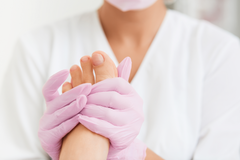The Role of Inflammation in Tissue Healing

by Dr. Emily Splichal, DPM MS
Aging, disease, and even COVID are all associated with inflammation and the negative impact this has on the body and health. But did you know that inflammation is actually an important and necessary step in the body’s natural defense against injury and immune responses.
Most of the body's defense elements are in the blood with inflammation or an inflammatory response being how these defense cells leave the blood and enter the tissue around the injured or infected site.
As this inflammatory response is triggered there are 4 cardinal signs of inflammation:
- Redness (rubor)
- Swelling (tumor)
- Heat (calor)
- Pain (dolor)
The benefits of these four inflammatory responses include:
- To dilute any harmful substances with tissue edema
- To bring large quantities of oxygen to the tissue to assist in the repair process
- To allow entry of clotting proteins (fibrin) to prevent the spread of bacteria

Like all processes in the body there is an ideal range of time or level of exposure correlated with the best outcomes. In the case of post-injury inflammation, the typical acute inflammatory cycle lasts several days (up to 7 days) with its decrease being associated with the body’s ability to enter the second phase of healing which is the fibroblastic or the subacute phase.
If this acute inflammatory phase persists beyond 7 days, then the rest of the healing process gets disrupted, and the body can enter a chronic or persistent state of inflammation. This is typically what is observed in chronic plantar fasciitis (osis) and can be associated with tissue damage and degeneration.
Ensuring proper reduction of the acute inflammatory response can be done in a variety of ways including oral or topical NSAIDs, oral or injected steroids, icing or natural supplements such as systemic enzymes.

Each of these comes with its own risks and benefits with systemic enzymes being the most natural to the body as they are designed to support the body’s natural immune response and management of the acute inflammatory cycle.



Leave a comment